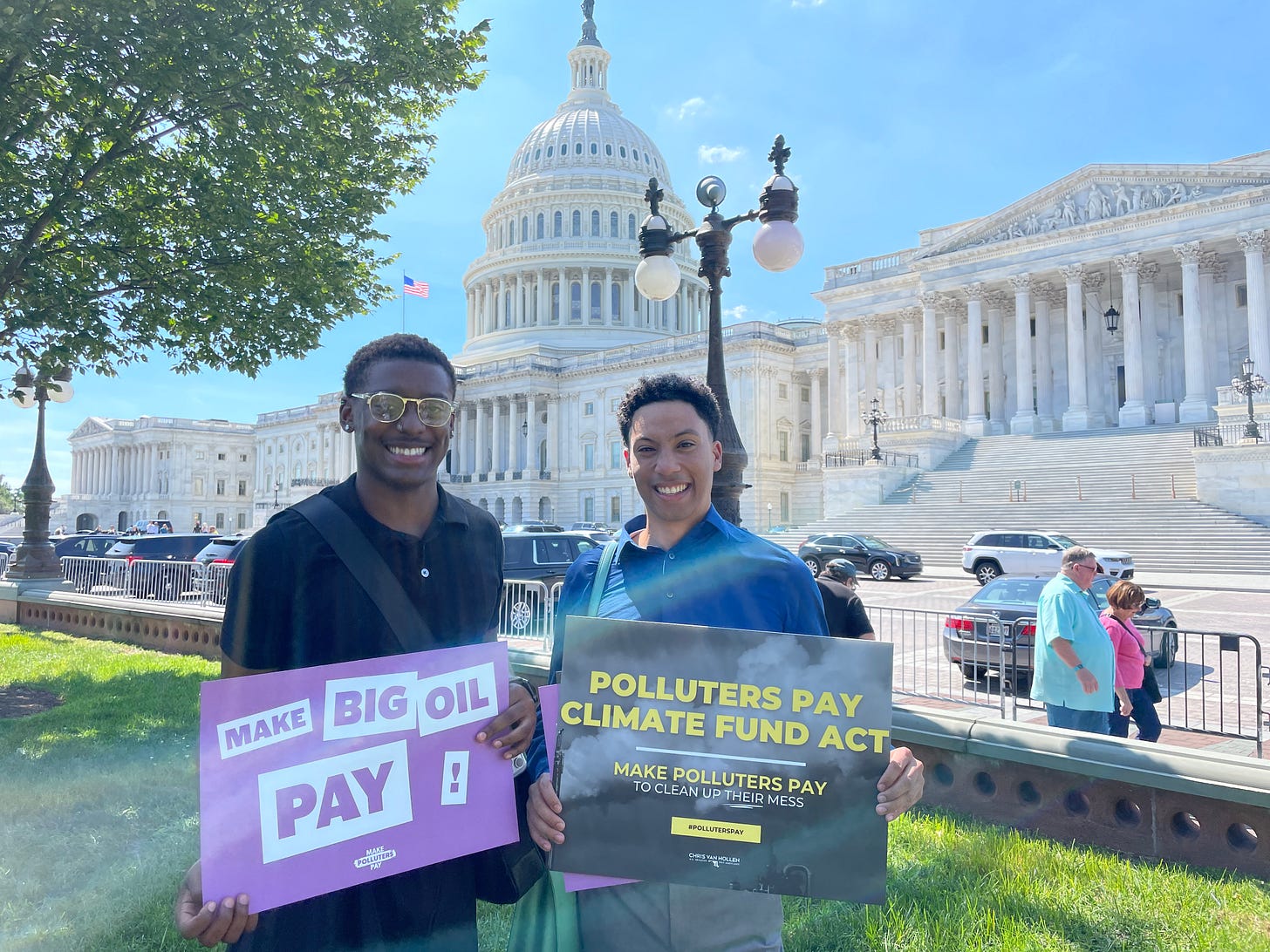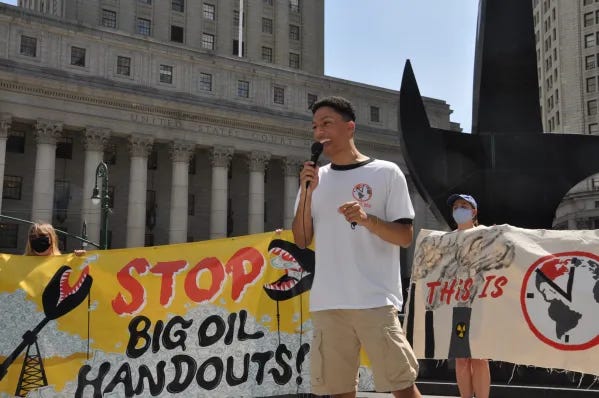Big Oil: Too Big to Fail
Our government made Big Oil too big to fail — now we’re footing the bill for climate catastrophe.
This is a guest post by guest collaborator and climate activist Zanagee Artis.
Every time I share about ending the era of fossil fuels on social media, someone’s in the comments saying something about how activists, including myself, are hypocritical for criticizing Big Oil while relying on the energy and products they produce.
Here’s an example from one of my recent posts. In the video, I urge people to comment to end Arctic drilling while hiking near Alaska’s Mendenhall Glacier, which has experienced accelerated glacial retreat as a result of climate change:
“LOL, time to go to school. Show us the conclusive evidence that can not be disputed. And how did you get there? You are wearing mostly plastic from oil, your phone and camera are from oil and I am betting you got there in a gas powered vehicle.”
To answer their question, I arrived in Alaska by plane, powered by jet fuel.
My Patagonia rain jacket is made of 100% recycled nylon, which is indeed plastic, albeit more sustainable than any other waterproof material on the market.
But how I arrived in Alaska, or how sustainable my phone and clothes are, is not the interesting part of this comment and the thousands of comments just like it across the internet.
This questioning gets so close to the point, yet entirely misses the mark.
The more interesting question is how did we arrive at a point in time when the vast majority of options available to us for all things — energy, communication, recreation, pleasure, and yes, clothing — are reliant on fossil fuels?
How did we get to a point where people point fingers at environmental advocates for driving cars instead of pointing fingers at the companies that lobbied to gut our public transit options, rip away our vast network of railroads, and ensure that internal combustion engine cars dominate the personal vehicle market?
As much as I love a witty spat in the comments of my posts, these are the questions that I really want to answer.
For decades, politicians and corporations have lauded capitalism and the free market for its ability to spur innovation and competition that allows consumers to choose the best goods and services for the best price point.
Politicians in both parties talk a big game about being “capitalists,” but Democrats and Republicans alike have been warping the market in favor of oil and gas for generations.
The goods and services we can choose from are not because of free market competitiveness, but rather the result of an oligarchy behind the curtain that has successfully maintained the illusion of choice while ensuring that all of the options prioritize their benefit over the public’s.
Big Oil knew that the fossil fuel economy would cause climate change as early as 1959, and instead of transitioning to renewable energy, they proceeded to spend vast amounts of money and resources to convince the public that environmental stewardship began with the individual.
The fact is, climate science is settled. We know with certainty that the combustion of greenhouse gases causes climate change and increases the frequency and strength of disasters like heatwaves, hurricanes, and floods.
The industry knew it before anyone else, yet they continued to operate business-as-usual, and deflected responsibility with widespread promotion of recycling and the myth of the “carbon footprint.” All the while, they spent millions lobbying Congress and presidential administrations to favor oil and gas production in the law. Fossil fuel subsidies are one result of that influence.
The International Monetary Fund estimated that, in 2022, taxpayers around the world paid $7 trillion in subsidies to the fossil fuel industry.
That number is staggering, and it's grown since then.
At the price of oil today, a huge share of subsidies for fossil fuel production in the US are flowing straight to profits. Instead of making energy more affordable, Big Oil keeps prices high and dishes out your tax dollars to shareholders and executives.

The continued auctioning of our oceans and public lands for oil and gas drilling is another example. Companies pay low royalty rates on federal leases, enjoy fast-tracked permits for development, and regularly escape responsibility for cleaning up abandoned infrastructure while continuing to rake in record profits. Oil spills and climate disasters happen every day that they’ll never pay a dime for.
The fossil fuel industry and their front groups have succeeded in convincing large swaths of the public that climate change isn’t a major threat and that their products are the only viable option to meet the 21st century needs of a growing global population.
Petroleum is in everything by design, and that’s made Big Oil too big to simply collapse overnight despite the gravity of the climate crisis we’re in.
Everything from food packaging to transportation to medical supplies to the ink in our children’s pens relies on petroleum drilled from an oil well.
So the market is warped to entrench oil and gas over any other energy source, and the industry is able to fund political campaigns and front groups to maintain a vice grip on our energy options. So where do we go from here?
For starters, we can make polluters pay.
Oil and gas companies should pay for the costs of the climate disasters that their products intensify.
They should pay for the oil spills that they cause and the oil rigs that they abandon.
They should pay the full cost to produce oil, gas and plastics, instead raking in billions from public coffers.
They ought to be held liable for spending billions on misinformation and disinformation campaigns to dissuade both the government and the public from systemic climate action.
It’s up to our government to hold the industry accountable for what they’ve done to nature and to humanity. Because the thing is, by forcing oil and gas companies to cover the real costs of their business, they lose the ability to externalize those harms onto everyone else.
Suddenly, the industry’s profits look a lot smaller. Suddenly, renewable energy and efficiency look not just cleaner, but cheaper and fairer. Accountability reshapes the playing field. And accountability also creates resources. When polluters pay into climate superfunds or are held liable in court, that money can flow back into the very things they denied us: resilient infrastructure, affordable clean power, functioning transit systems, and a safety net for communities on the frontlines. Instead of endless subsidies and bailouts, we could have a steady source of funding for the future we deserve.
And it’s up to us to fight for that future, and demand accountability from our government.
So next time you find yourself priming your thumbs to criticize someone for driving a car or flying on a plane, redirect that energy to the people responsible for a world run by fossil fuels: politicians and the oligarchy that bought them.




Les profits sont un leurre. La "richesse" un piège matérialiste.